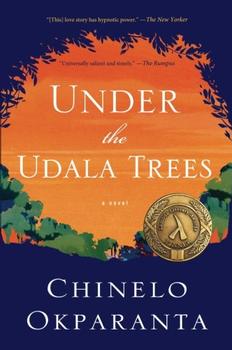Summary | Excerpt | Reading Guide | Discuss | Reviews | Beyond the Book | Readalikes | Genres & Themes | Author Bio

1
Midway between Old Oba-Nnewi Road and New Oba-Nnewi Road, in that general area bound by the village church and the primary school, and where Mmiri John Road drops off only to begin again, stood our house in Ojoto. It was a yellow-painted two-story cement construction built along the dusty brown trails just south of River John, where Papa's mother almost drowned when she was a girl, back when people still washed their clothes on the rocky edges of the river.
Ours was a gated compound, guarded at the front by a thicket of rose and hibiscus bushes. Leading up to the bushes, a pair of parallel green hedges grew, dotted heavily in pink by tiny, star-like ixora flowers. Vendors lined the road adjacent to the hedges, as did trees thick with fruit: orange, guava, cashew, and mango trees. In the recesses of the roadsides, where the bushes rose high like a forest, even more trees stood: tall irokos, whistling pines, and a scattering of oil and coconut palms. We had to turn our eyes up toward the sky to see the tops of these trees. So high were the bushes and so tall were the trees.
In the harmattan, the Sahara winds arrived and stirred up the dust, and clouded the air, and rendered the trees and bushes wobbly like a mirage, and made the sun a blurry ball in the sky.
In the rainy season, the rains wheedled the wildness out of the dust, and everything took back its clarity and its shape.
This was the normal cycle of things: the rainy season followed by the dry season, and the harmattan folding itself within the dry. All the while, goats bleated. Dogs barked. Hens and roosters scuttled up and down the roads, staying close to the compounds to which they belonged. Striped swordtails and monarchs, grass yellows and redtops? - all the butterflies? - flitted leisurely from one flower to the next.
As for us, we moved about in that unhurried way of the butterflies, as if the breeze was sweet, as if the sun on our skin was a caress. As if slow paces allowed for the savoring of both. This was the way things were before the war: our lives, tamely moving forward.
But in 1967, the war barged in and installed itself all over the place. By 1968, the whole of Ojoto had begun pulsing with the ruckus of armored cars and shelling machines, bomber planes and their loud engines sending shock waves through our ears.
By 1968, our men had begun slinging guns across their shoulders and carrying axes and machetes, blades glistening in the sun; and out on the streets, every hour or two in the afternoons and evenings, their chanting could be heard, loud voices pouring out like libations from their mouths: "Biafra, win the war!"
It was that same year, 1968? - the second year of the war? - that Mama sent me off.
By this time, talk of all the festivities that would take place when Biafra defeated Nigeria had already begun to dwindle, supplanted, rather, by a collective fretting over what would become of us when Nigeria prevailed: Would we be stripped of our homes, and of our lands? Would we be forced into menial servitude? Would we be reduced to living on rationed food? How long into the future would we have to bear the burden of our loss? Would we recover?
All these questions, because by 1968, Nigeria was already winning, and everything had already changed.
But there were to be more changes.
There is no way to tell the story of what happened with Amina without first telling the story of Mama's sending me off. Likewise, there is no way to tell the story of Mama's sending me off without also telling of Papa's refusal to go to the bunker. Without his refusal, the sending away might never have occurred, and if the sending away had not occurred, then I might never have met Amina.
If I had not met Amina, who knows, there might be no story at all to tell.
So, the story begins even before the story, on June 23, 1968. Ubosi chi ji ehihe jie: the day night fell in the afternoon, as the saying goes. Or as Mama sometimes puts it, the day that night overtook day: the day that Papa took his leave from us.
Excerpted from Under the Udala Trees by Chinelo Okparanta. Copyright © 2015 by Chinelo Okparanta. Excerpted by permission of Houghton Mifflin Harcourt. All rights reserved. No part of this excerpt may be reproduced or reprinted without permission in writing from the publisher.
When you are growing up there are two institutional places that affect you most powerfully: the church, which ...
Click Here to find out who said this, as well as discovering other famous literary quotes!
Your guide toexceptional books
BookBrowse seeks out and recommends the best in contemporary fiction and nonfiction—books that not only engage and entertain but also deepen our understanding of ourselves and the world around us.